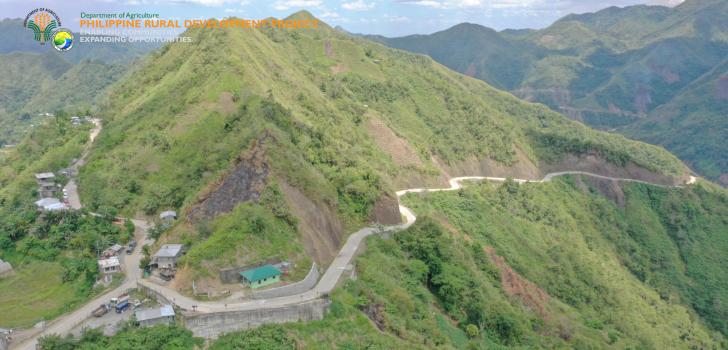
43K Cordi households reap gains under DA-PRDP infra dev component
Over 43, 000 households in the Cordillera Administrative Region are now reaping the benefits from 48 completed agri-infrastructure subprojects (SPs) implemented under the Philippine Rural Development Project (PRDP), one of the Department of Agriculture’s (DA) flagship programs.
With eight years of implementation, the DA-PRDP has completed the construction and improvement of 126 kilometers of farm-to-market roads, nine irrigation systems servicing 212 hectares, 19 other agri-infrastructures (warehouse, tramlines, etc.), and has provided several communities with access to potable water – from December 2014 to December 2022 in the Cordillera provinces.
As of December 31, 2022, the Regional Project Coordination Office (RPCO) – CAR has completed 48 infrastructure SPs amounting to PhP2.56 billion, while three (3) SPs amounting to PhP369.57 million are ongoing and one SP with No Objection Letter 1 (NOL1). The ongoing SPs are financed under the 2nd Additional Financing (AF2).
The province of Ifugao has the highest number of completed infrastructure SPs with 17 SPs amounting to PhP583 million, followed by the province of Benguet with 11 SPs (PhP533 million), and Apayao with eight SPs (PhP290 million). Meanwhile, the province of Kalinga has the highest cost of completed infrastructure SPs totaling to PhP794 million with five SPs, followed by the province of Ifugao, and Mountain Province with PhP327 million (6 SPs). The province of Abra has the least cost of completed infrastructure SPs amounting to PhP30 million (1 SP).
As the project shifts to a new phase following the implementation of the PRDP Original Loan (OL) in 2014, PRDP Additional Financing (AF1) in 2018, and PRDP AF2 in 2022, the PRDP Scale-Up will roll out a new basis for investment through a regional and interprovincial perspective in investment and planning.
While the PRDP OL and the AF1 were committed to achieving increased productivity, incomes, and climate resiliency in rural communities; and the AF2 in addressing the demands of the New Normal (post-COVID), the PRDP Scale-Up will highlight clustering and consolidation as a strategy, enhanced participation of the private sector, and climate resiliency of project interventions. It is set to be implemented this year until 2029.
With this, the RPCO-CAR has been conducting preliminary activities to ensure that project stakeholders are looped in early on and to assess the feasibility of proposed SPs. These activities include the conduct of orientations to provincial and municipal LGUs and validation of proposed infrastructure SPs for possible funding under the PRDP Scale-Up.
Several LGUs have already expressed their intent to participate in the PRDP Scale-Up with their submission of requests for SP validation. To date, more than 20 infrastructure SPs are now undergoing validation process at the RPCO-CAR level. If found feasible, the implementing LGUs will then prepare the necessary documents and requirements.
Under the infrastructure component or I-BUILD, the focus will be on delivering climate-resilient access and value chain infrastructure support to build up food distribution hubs and logistics systems. Infrastructure development proposals should still be anchored on the Provincial Commodity Investment Plan (PCIP)/ Regional Agri-Fishery Investment Portfolio (RAFIP). (By: Elvy T. Estacio, Writer, RPCO-CAR InfoACE)
